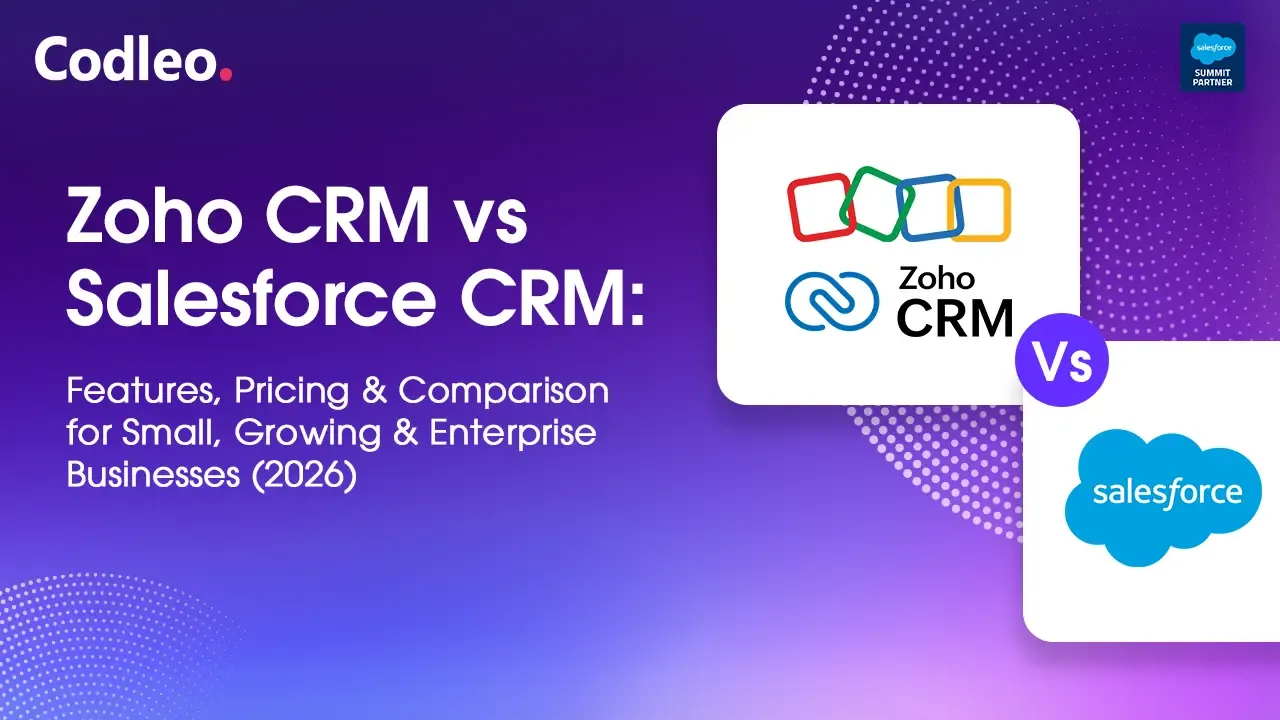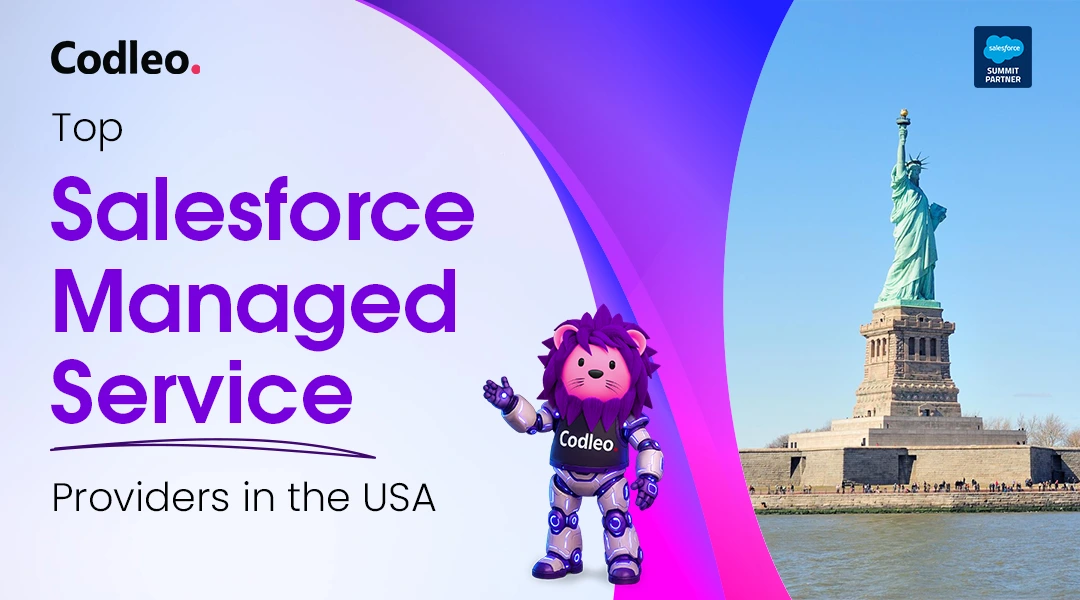
Salesforce Developer: Roles, Skills and Day‑to‑Day Responsibilities

Customers of all types and sizes are benefiting from the Salesforce platform and Salesforce Customer 360 to run their businesses better.
And the reason for the success of the Salesforce behemoth is thousands of Salesforce administrators, consultants, and developers. Yet while Salesforce administrators and consultants don’t have to code to configure the platform, Salesforce developers can expand the platform in all sorts of ways.
Salesforce developers (also known as SFDC developers or Salesforce engineers) help companies simplify processes and streamline success by developing solutions to business problems within the Salesforce ecosystem: customizing the Salesforce platform, building system customization, and no-code functionality into their Salesforce app.
In this article, we are going to talk about the job of Salesforce programmers, what they do, what qualities a Salesforce programmer should possess, and the services they offer customers.
What is a Salesforce Developer?
A Salesforce developer (SFDC developer) is responsible for end-to-end development of a Salesforce implementation and can do both the back-end and front-end coding. They develop software, engineering their products using Force.com, Lightning App Builder, and Heroku.
Besides, Salesforce devotees are forced to have a never-ending to-do list and face a pile of software to learn – Visualforce framework, Apex code, Aura components, Lightning framework, Web services, SQL, Salesforce Object Query Language (SOQL), Salesforce Object Search Language (SOSL), HTML, JavaScript, etc.
They can become a Salesforce development consultant, CRM developer, integration specialist, data migration developer, or customization developer.
Salesforce Developer Tools and Languages: What You Need to Know
When it comes to developing for Salesforce, traditional programming languages are only just the beginning. Developers should also be familiar with Salesforce-specific tools and platforms that enable them to build robust cloud apps quickly. Here’s a rundown of the primary tools and languages that Salesforce developers typically use:
Force.com Platform
Force. Com is the cloud platform for building and running business applications. It forms the basis for building cloud-based programs and services, allowing developers to concentrate on building their solutions without worrying about the infrastructure.
Lightning App Builder
It is a user-friendly, drag-and-drop tool that enables developers and administrators to build pages and app components without writing code. From creating one-page apps to dashboards that help track your business performance, Lightning App Builder simplifies app customization.
Heroku Platform
Heroku is a flexible cloud platform that Salesforce developers use when building, running, and scaling applications. It provides ultimate freedom by supporting multiple programming languages and offering easy scalability, making it perfect for complex or high-demand apps.
Apex Programming Language
Apex is a Salesforce-specific programming language used to add custom functionality to your Salesforce org. Developers write Apex to create custom integrations, API calls, triggers (which automate actions based on record changes), and other backend logic.
Visualforce Framework
Visualforce uses an XML-like markup language to design user interfaces in Salesforce. It’s primarily used to build custom pages and components that render as HTML, enabling fine control over how your app looks and behaves.
Lightning Components Framework
Lightning Components is a modern framework for building dynamic web apps that work smoothly on both desktop and mobile devices. They come in two styles: Lightning Web Components (the newer standard based on JavaScript) and Aura Components (an earlier framework for building complex applications).
Lightning Aura Components
Aura Components are used to create interactive, single-page applications inside Salesforce. They enable developers to create rich, multi-level interfaces that deliver a seamless user experience.
Salesforce Object Query Language (SOQL)
SOQL is derived from SQL, for the express purpose of querying the Salesforce platform. It’s a way for developers to efficiently access records and data from Salesforce’s database according to certain conditions.
Salesforce Object Search Language (SOSL)
SOSL extends SOQL by allowing text searching of multiple Salesforce objects. Great for doing quick searches on records that have specific keywords or phrases within your Salesforce instance.
Developers: Salesforce development is a unique combination of universal programming knowledge with knowledge of Salesforce-specific tools and languages. They have mastered this blend to give you personalized, scalable, and user-friendly cloud apps that are perfect for your business.
What Does a Salesforce Developer Actually Do?
Salesforce developers are the creative minds behind custom Lightning web components and Visualforce pages. They build tailored features that enhance the Salesforce platform and develop innovative apps for Salesforce’s AppExchange marketplace. Beyond this, they design integration solutions and applications that streamline internal business processes.
Essential Skills and Requirements for Salesforce Developers
Key Qualifications of a Salesforce Developer
To excel as a Salesforce developer, there are some basic technical prerequisites and qualifications to look for:
-
A bachelor’s degree in computer science, software engineering, or a related field
-
Proven experience in developing software applications
-
Practical knowledge of scripting and programming languages such as Apex, JavaScript, Visualforce, and SQL
-
Strong proficiency with the Salesforce CRM platform and its ecosystem
-
Experience designing user-friendly, customer-facing interfaces
-
Solid understanding of object-oriented programming fundamentals (OOP)
-
Basic working knowledge of languages like Java, C#, and .NET is a plus
Core Technical Expertise
-
Writing Apex code for custom logic, triggers, and batch processing
-
Designing and implementing Visualforce pages and Lightning Components
-
Competence in data modeling, data management, and database query languages, including SOQL and SOSL
-
Hands-on experience building and maintaining Force.com or Site.com sites
-
Mastery of the Lightning Framework and Aura components
-
Developing APIs and integrating Salesforce with external systems
Additional Essential Knowledge
-
Familiarity with Salesforce Customer Communities and experience developing and maintaining them
-
Ability to build scalable, secure, and maintainable Salesforce solutions
-
Strong focus on testing and debugging Apex code to ensure high-quality deliverables
Requirements and Essential Certifications for Salesforce Developers
To become a certified Salesforce developer, a software engineer must first pass one of these key exams:
Salesforce Certified App Builder
This certification teaches you how to use the no-code features of the Salesforce platform.
Platform Developer I
This certification helps you understand different programming features.
JavaScript Developer I
This certification demonstrates that the developer is proficient in using JavaScript, both in Node.js and in web browsers.
Salesforce developers can enhance their skills by earning the Platform Developer II or Application Architect certifications. They can also pursue other specialized certifications in specific areas.
B2C Commerce Developer
This certification demonstrates that the engineer is capable of configuring Salesforce Commerce, managing users, and developing features using the Salesforce B2C Commerce Digital platform.
Marketing Cloud Developer
This certification focuses on creating personalized messages and landing pages tailored to individual needs and preferences. It also covers advanced segmentation and provides training on reporting and analytics.
Industries CPQ Developer
This credential shows that the programmer can create, set up, price, and quote software for Salesforce Clouds in the media, energy, and utilities sectors.
Omnistudio Developer
This certification shows that you can use OmniStudio's tools to create cloud apps.
Slack Certified Developer
This certification demonstrates that the developer is capable of building interactive apps on the Slack platform.
MuleSoft Certified Developer
This credential shows that an engineer can create, test, and launch APIs and integrations using the MuleSoft platform.
Additionally, a Salesforce developer can move up to a Salesforce Technical Architect by passing various certifications. These include Identity and Access Management Architect, Integration Architect, and Data Architect, among others.
Fundamental Salesforce Developer Skills
The desired set of Salesforce developer skills looks like this:
-
Analytical skills,
-
Communication skills,
-
Problem-solving skills,
-
Logical skills,
-
Designer’s mindset,
-
Attention to detail,
-
Learner’s mindset,
-
Process automation.
Hiring a certified Salesforce developer is not always essential for your project’s success. However, a developer’s certification clearly shows they know how to use the Salesforce platform. It also serves as reliable proof of their technical skills.
A development project cannot succeed just because of the developer's skills and knowledge. It is a complex process that involves several stages. It begins with detailed business and technical analysis, followed by the actual development and change management. If you look for a specialist who claims to be great at everything—like development, QA, project management, and business analysis—you may end up with someone who is not particularly strong in any of these areas.
To avoid using a complicated solution that no one understands and that doesn’t meet your business needs, it’s essential to work with a Salesforce developer company like Codleo. Our agency has over 70 Salesforce consultants, app builders, and developers. When you partner with us, you gain access to the combined knowledge of our entire team, which has helped more than 100 businesses over the past 7 years.
We have extensive experience in developing apps for AppExchange and creating custom software. This experience allows us to apply best practices in Salesforce development and stay updated with current trends in business consulting and project management.
What Do Salesforce Developers Do for Clients? Their Key Responsibilities
Salesforce developers play a crucial role in helping clients get the most out of their Salesforce platform. They combine technical expertise with problem-solving skills to deliver tailored solutions, streamline business processes, and ensure smooth system operations. Here’s what they typically do for clients:
-
Consultation and System Review: They assess existing Salesforce setups, identify gaps, and provide technical advice on optimizing system performance.
-
Solution Design and Architecture: Developers design scalable solutions, review code, and carefully weigh the impact, limitations, and long-term effects of technical decisions.
-
Data Migration Support: They build and implement batch classes to securely move large volumes of data while preventing loss or corruption.
-
User-Centered Design: By adding custom styling and layouts, they ensure Salesforce pages and components are visually appealing, intuitive, and easy for teams to use in Lightning App Builder.
-
Custom Lightning Components: Developers create reusable Lightning Components that simplify development and enhance user functionality.
-
Data Optimization and Management: They handle database modeling, remove duplicate records, run data queries across custom and standard objects, and manage DML operations efficiently while staying within Salesforce’s governor limits.
-
Testing and Code Quality: Writing test classes and resolving code coverage issues ensures the system is reliable and meets Salesforce’s best practices.
-
Customization for Business Needs: Developers build custom objects, reports, and dashboards tailored to sales, marketing, and operational goals.
-
Custom Functionality: They create custom fields, validation rules, controllers, and extensions to support unique business requirements.
-
Security and User Management: Managing user roles, system security, single sign-on, and custom security settings helps safeguard client data and maintain compliance.
-
Apex Development: They write Apex classes, triggers, and controllers to automate processes and extend Salesforce functionality across different applications.
-
Third-Party Integrations: Developers connect Salesforce with other applications and services already in use, ensuring smooth interoperability and data flow.
Wrap Up
Salesforce development improves user experience and satisfaction with the product. A Salesforce developer works behind the scenes to customize your Salesforce solution, address user challenges directly in Salesforce, maximize your investment in Salesforce, and help you gain an edge over your competitors.
If you want to join the Salesforce team, you can get a precise estimate of your Salesforce project cost and hire skilled engineers. Codleo has over 70 Salesforce experts with experience in more than 10 Salesforce Clouds, AppExchange apps, and custom software development. Contact us and start improving your company's technology.
Latest Blog
Say "hello" to us and lets gets talking
Partner with the best team in the world for your CRM or other digital needs.
Contact Us




